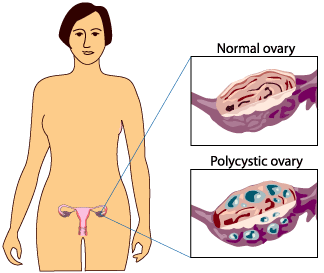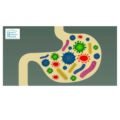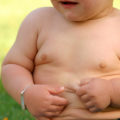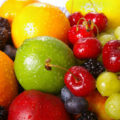I have a special interest in writing this article on PCOD or PCOS (Poly Cystic Ovarian Disease or Poly Cystic Ovarian Syndrome).
I was shocked when I heard a gynaecologist saying that every second female young of child bearing is having PCOD. It is very common to have PCOD. That means every single women has difficulty in conception as it is one of the leading cause of infertility.
PCOD (Earlier Stage) and PCOS (Later Stage) both are same disease with different names. It is the most common hormonal disorder affecting women, associated with ovaries.
PCOD disease will eventually turn into PCOS when it manifests by increased weight gain (obesity), excessive hair growth, increased male hormone, decreased voice, hair loss (male pattern loss) and diabetes. Polycystic ovaries are characterised by the presence of many small cysts (fluid filled swellings) around the surface of the ovaries. The cysts are quite small ranging from 2 to 8 mm.
In PCOD, follicles are created, but they don’t convert into egg. The ovaries keep on generating follicles which results in too many cysts in it. There is no egg formation which starts menstrual cycle and no fertilization. Ovaries are not functioning properly they continue to make more of male hormones which lead to excess growth of hair or excessive hair fall like men.
Image Source
Factors responsible for PCOD/ PCOS
- Family history of ovarian cysts
- Obesity or over weight
- Lack of physical activity
- Stress
- High Fat (lipid) levels
- Insulin/glucose (sugar) intolerance
- Blood pressure (hypertension).
- Over-production of insulin and testosterone.
- Overactive pituitary glands.
Symptoms of PCOD/PCOS
- Irregular/absent menstrual cycles
- Irregular bleeding
- Infertility or inability to get pregnant because of not ovulating
- Miscarraige
- Increased growth of hair on the face, chest, stomach, back, thumbs, toes
- Acne
- Oily skin
- Dandruff
- Pelvic pain
- Depression
- High blood pressure
- Weight gain or obesity
- Extra weight around the waist
- Diabetes – Type 2
- High cholesterol
- Non- alcoholic fatty liver disease
- Male-pattern baldness or thinning hair
- Patches of thickened and dark brown or black skin on the thighs, arms, breasts, neck
- Skin tags or tiny excess flaps of skin in armpits or neck area
Dietary modifications required:
Weight loss is the most effective method to restore normal ovulation/ menstruation because PCOD/ PCOS is associated with obesity and overweight.
A scientific review in 2013 found similar decreases in weight and body composition and improvements in pregnancy rate, menstrual regularity, ovulation, hyperandrogenism, insulin resistance, lipids, and quality of life to occur with weight loss independent of diet composition.
Still, a low GI diet, in which a significant part of total carbohydrates are obtained from fruit, vegetables, and whole-grain sources, has resulted in greater menstrual regularity than anmacronutrientnmatched healthy diet. Vitamin D deficiency may play some role in the development of the metabolic syndrome, so treatment of any such deficiency is indicated.
PCOD encourages weight gain and fat has an adverse effect on the hormone balance leading to an escalating spiral of the problems. Obesity reduces the chances of pregnancy and increases the risk of pregnancy complications including miscarriage, high blood pressure and thromboembolism.
In the long-term obesity, is a major risk factor for heart disease. Every effort to maintain a normal weight by diet as well as exercise is to be encouraged. There is some evidence that women with PCOD lay down fat more easily. They may be overweight without indulging in excessive calorie intake.
The most important tip on diet for PCOS would be to cut down on simple sugars. Sweet foods bring about a rise in the blood sugar levels, which places undue stress on the body, this leads to poor control of blood sugar and weight gain.
Cutting down on sugary foods becomes very crucial when you have PCOD. The correct diet for PCOS includes complex carbs instead of simple ones. It is important to develop a taste for nutritious foods rather than eating junk.
Here is a table that shows what to have and what to avoid in diet for PCOS.
| Do’s | Don’ts |
| Whole wheat products | Refined flour products / maida |
| Whole grain / whole wheat bread | White bread |
| wholegrain / whole wheat pasta | white pasta |
| Barley | Fast foods |
| Oats, corn | Cakes, cookies, sweets, chocolates |
| Raw fruits and vegetables | High fructose corn syrup |
| Fresh fish | Sorbitol |
| Lean meats | Soft drinks and soda |
| Protein shakes | Bengali mithai, sweets , desserts |
Diet Instructions for PCOS women
- Eat the right kind of food. Eat lots of vegetables, fruits and protein-rich food. Have green vegetables as it contains a lot of folic acid in them. Folic acid is often advised by gynecologists to women who are planning to conceive or who are pregnant.
- Drink plenty of water and be hydrated. Regular intake of water will help with detoxification as well as avoid water retention in the body.
- Consume vitamin C-rich food by eating plenty of fruits like orange, lemon, sweet lime, grape fruit, and grapes.
- Alcohol and smoking is a big NO.
- Eat wholegrain foods instead of processed, refined foods such as wheat flour (maida). Also, whole fruit instead of fruit juice will maintain insulin and blood sugar levels.
- Avoid cakes, pastries, junk food, colas, jams and pickles
- Eat foods that are high in fiber as they will also cause a slower, more controlled rise in blood sugar and insulin levels.
- Incorporate legumes and vegetables in your diet as they’re high in fiber and nutrients and will manage your sugar levels.
- Combine protein and carbohydrates as protein helps to regulate the blood sugar spike caused by the carbs.
- Eat small, healthy meals more frequently to manage cravings and hunger pangs and NEVER miss breakfast!
- Corn, soy, cottonseed, and grapeseed oils should be avoided.
- Avoid soy products.
- Also avoid chemical preservatives, additives, artificial sweeteners and colorings.
- Exercise: Regular exercise will not only help you reduce weight, but will help lessen binge eating. The feel-good hormones (serotonin and dopamine) released with exercise will keep your stress levels also low.
My personal advise would be don’t be scared of it; rather face it and fight back to get your fertility back. it’s not an incurable disease or syndrome. You have right to conceive and you have right to be fertile. Few changes in your lifestyle and eating habits will give you all those rights
RD Neha Kava
Latest posts by RD Neha Kava (see all)
- 3 Supplements To Try That Will Improve Your Health - March 15, 2025
- 3 Tips to Adding Supplements to Your Diet - March 14, 2025
- Beginners Running Tips – How to start getting in shape with the most efficient exercise out there - March 13, 2025





Hi mam,
I want to take diet plan from you. I have PCOD and apple shape body. My weight is 60kg and heigt is 5 ft. Please give me diet plan.
Thanks